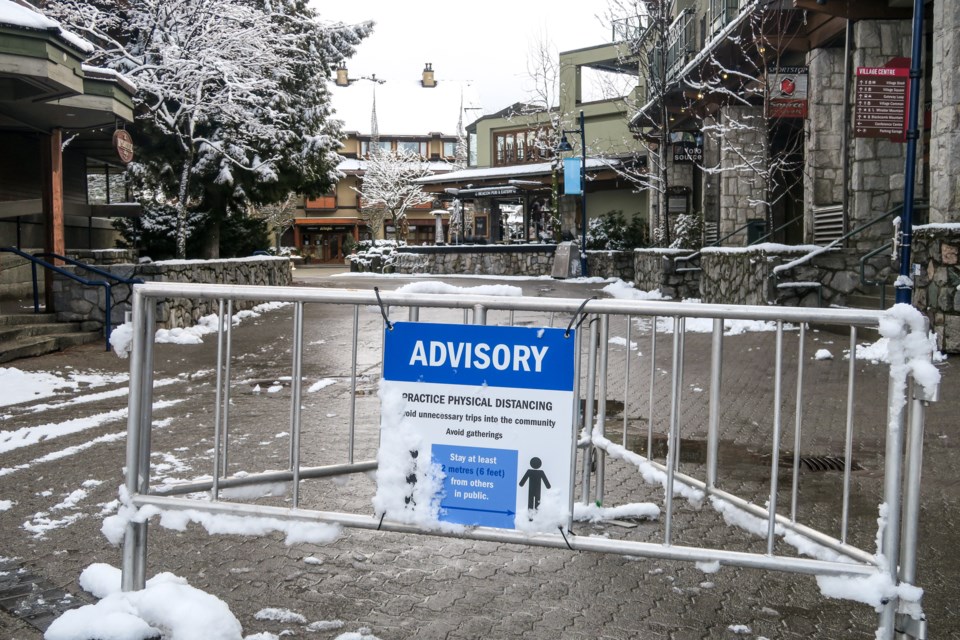Since early in the pandemic, Whistler’s resort stakeholders had been meeting regularly to discuss their response to COVID-19. So when Provincial Health Officer Dr. Bonnie Henry called on B.C.’s ski industry to come together to find ways to reduce transmission in the face of climbing case numbers, the resort was ready.
“We were well positioned,” said Sarah McCullough, Whistler Blackcomb’s (WB) director of community and government relations. “From the start of the pandemic, Whistler really had a partnership approach to responding.”
In response to surging case numbers in ski communities in recent weeks, the provincial government has teamed up on the campaign with WorkSafe BC, six local governments and the Canada West Ski Areas Association (CWSAA).
The goal is to reinforce protocols around quarantine, social gatherings, both in staff and valley housing, set up accommodation for residents to self-isolate safely, and assist employers in contact tracing.
At WB, much of those efforts were already underway, but the aim is to bolster communication with both staff and guests, and leverage existing messaging from the other participating communities, like the Fernie Strong website, with information around COVID protocols, that could work locally.
“On the messaging front, the single biggest difference is around the penetration into the grassroots within communities,” explained Christopher Nicolson, president and CEO of the CWSAA. “We know that the prevention of transmission at ski areas has been effective, but that’s at ski area operations. Where there hasn’t necessarily been the same comprehensive effort around the province—and this is what Dr. Henry brought forward—has been on mobilizing the entire ski ecosystem.”
What that means is using more “direct communication channels” to reach both employees and residents of ski towns, Nicolson said. At WB, that takes the form of things like posters, weekly emails, and conversations with staff-housing advisors and department supervisors, as well as new initiatives such as PA announcements at base areas and in lift lines, and new signage around mitigating maze jumping in lines, McCullough said.
“We have the channels, it’s just either beefing up the communications or adding materials and really focusing on what we can control, which is the lift lines, mask compliance, reservations, things like that,” she added. “You can never really over-communicate or over-educate on how we’re going to be able to work together to reduce transmission.”
Along with drawing on messaging from the CWSAA and the other participating communities—Fernie, Sun Peaks, Rossland, Revelstoke and Invermere—each specific community has the freedom to tailor their messaging to a local audience, which is useful when trying to cut through so-called COVID-19 fatigue.
“It’s not going to be one thing, it’s going to be a variety of different kinds of things,” said Nicolson. “And I definitely think peer-to-peer [communication is effective], and if we think of the ski ecosystem, it’s leveraging those distribution channels that already exist within our ski communities across the province and tend to be a little unique.”
The campaign’s digital footprint is divided into two streams: the Ski BC Strong arm (skibcstrong.ca) targeting local residents and employees of ski communities, and the Ski Well, Be Well arm (skiwellbewell.ca) targeting visitors and guests.
Tourism Whistler said it would be supporting the Ski BC Strong initiative by sharing messaging and information through its member website, newsletter and at member meetings, while it will be assisting the Ski Well, Be Well effort via its visitor-facing channels, such as whistler.com, its Whistler Insider blog, and its social media channels.
“The focus of the messaging is things like: planning ahead, following COVID-19 safety protocols, sticking to your household bubbles and avoiding social gatherings/parties,” explained a TW spokesperson in an email.
B.C. health officials have said Whistler’s recent uptick in cases has largely been due to social gatherings, and the campaign will include more education for ski resort employees and residents on that front.
“When you look at the employee groups within the communities, that’s definitely one target, but you’re also looking at residents within communities: families, children with play dates and couples of any age having dinner parties,” Nicolson said, adding that addressing protocols in shared housing will be a particular focus.
“Dr. Henry definitely focused in on shared accommodations, but typically private shared accommodations,” he said. “That was an area that was highlighted, so this is where we get into both the messaging standpoint as well as opportunities for isolation.”
Whistler had already established a process to link residents unable to isolate in shared housing with safe accommodation, which Nicolson said wasn’t the case at some of the other participating ski communities.
The campaign will also include digital and TV ads spearhead by the CWSAA.



